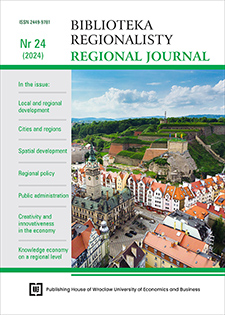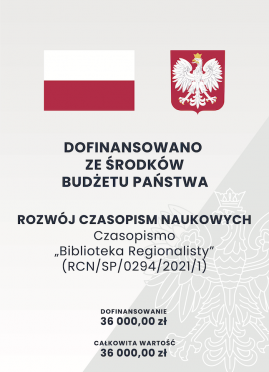Sustainable development of Polish cities – case study of Wrocław
DOI:
https://doi.org/10.15611/br.2024.1.11Keywords:
sustainable development, sustainable development goals, Agenda 2030, city, WrocławAbstract
Aim: The aim of this paper is to assess the achievements of goal 11 of Agenda 2030 halfway through the time frame of the adopted resolution. Considerations are undertaken using, as an example, Wrocław, one of the most important Polish metropolises.
Methodology: The paper uses critical analysis of the literature and strategic documents, as well as statistical analysis. Sustainable development is considered from three aspects: economic, social and environmental. A review is also conducted of actions implemented by the Wrocław authorities that have contributed to achieving the city’s sustainable development.
Results: Thanks to a high level of socio-economic development it is possible to implement a range of initiatives aimed at improving the natural environment and the rational use of resources, however, despite the actions taken, achieving sustainable development remains in the sphere of long-term strategic plans.
Implications and recommendations: In an era of increasing urbanization, ever more attention is focused on cities. By accumulating capital, population and cultural and art institutions within their territory, they become the driving force of socio-economic development. However, for many years this development was at the cost of the natural environment. In this context, goal 11 of the United Nations’ Agenda for sustainable development to the year 2030 is of particular importance. This goal focuses on the sustainable development of cities, their safety and social inclusion. Polish cities also face the challenge of implementing the ideas of sustainable development.
Downloads
References
Akuraju, V., Pradhan, P., Haase, D., Kropp, J. P., & Rybski, D. (2020). Relating SDG11 indicators and urban scaling – an explo-ratory study. Sustainable Cities and Society, 52, Article 101853. https://doi.org/10.1016/j.scs.2019.101853
Arcadis. (2021). Ranking polskich miast zrównoważonych Arcadis 2021. https://www.arcadis.com/pl-pl/aktualnosci/europe/poland/2021/7/ranking-polskich-miast
Blasi, S., Ganzaroli, A., & De Noni, I. (2022). Smartening sustainable development in cities: Strengthening the theoretical linkage between smart cities and SDGs. Sustainable Cities and Society, 80, Article 103793. https://doi.org/10.1016/j.scs.2022.103793
Broniewicz, E. (2017). Gospodarowanie przestrzenią w warunkach rozwoju zrównoważonego. Oficyna Wydawnicza Politech-niki Białostockiej.
Cele Zrównoważonego Rozwoju. (n.d.). Rezolucja Zgromadzenia Ogólnego A/RES/70/1: Agenda na rzecz zrównoważonego rozwoju 2030. https://www.un.org.pl/agenda-2030-rezolucja
Florida, R. (2002). The rise of the creative class: And how it’s transforming work, leisure, community and everyday life. Basic Books. https://doi.org/10.2307/3552294
Główny Urząd Statystyczny. (n.d.). Bank Danych Lokalnych. https://bdl.stat.gov.pl/bdl/start
Gotowska, M. (2017). Od równowagi bytu do zrównoważonego społeczeństwa. Studia i Prace WNEiZ US, 4(9), 43-54. https://doi.org/10.18276/sip.2017.49/1-04
Mierzejewska, L. (2015). Zrównoważony rozwój miasta – wybrane sposoby pojmowania, koncepcje i modele. Problemy Rozwoju Miast, (3), 5-11.
Ministerstwo Funduszy i Polityki Regionalnej. (n.d.). Krajowa Polityka Miejska 2030. https://www.gov.pl/web/fundusze-regiony/polityka-miejska
Ministerstwo Rozwoju i Technologii. (2023). Realizacja Celów Zrównoważonego Rozwoju w Polsce. Raport 2023. https://www.gov.pl/web/rozwoj-technologia/monitoring-realizacji-agendy-2030
Niemets, K., Kravchenko, K., Kandyba, Y., Kobylin, P., & Morar, C. (2021). World cities in terms of the sustainable development concept. Geography and Sustainability, 2(4), 304-311. https://doi.org/10.1016/j.geosus.2021.12.003
Rzeńca, A. (2016). EkoMiasto#Środowisko. Zrównoważony, inteligentny i partycypacyjny rozwój miasta. Wydawnictwo Uniwersytetu Łódzkiego.
Strategia Wrocław 2030. (2019). https://www.wroclaw.pl/rozmawia/strategia-rozwoju-wroclaw-2030
Trindade, E. P., Farias Hinnig, M. P., Moreira da Costa, E., Sabatini Marques, J., Cid Bastos, R., & Yigitcanlar, T. (2017). Sustainable development of smart cities: A systematic review of the literature. Journal of Open Innovation: Technology, Market, and Complexity, 3(3), 1-14. https://doi.org/10.1186/s40852-017-0063-2
United Nations. (2015). Transforming our world: the 2030 Agenda for Sustainable Development. https://sdgs.un.org/2030agenda
United Nations Association Poland. (2021). Zrównoważony rozwój miast w Polsce – od teorii do praktyki. https://www.unapoland.org/post/raport
World Commission on Environment and Development. (1987). Our common future. Oxford University Press.
Wrocławskie Standardy Dostępności. (2019). https://www.wroclaw.pl/rozmawia/wroclawskie-standardy-dostepnosci
Downloads
Published
Issue
Section
License
Copyright (c) 2025 Agnieszka Krześ

This work is licensed under a Creative Commons Attribution-ShareAlike 4.0 International License.
Accepted 2024-12-02
Published 2025-01-31







